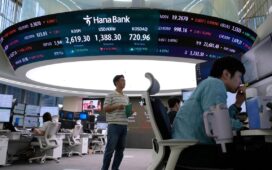The Governor of the Central Bank of Nigeria (CBN), Mr. Olayemi Cardoso, has announced that volatility in the foreign exchange (FX) market has declined significantly, falling below 0.5%, as Nigeria’s monetary and fiscal reforms begin to stabilise the macroeconomic environment.
Speaking during a press briefing in Abuja on Tuesday following the 300th Monetary Policy Committee (MPC) meeting, Cardoso emphasised that the reduction in exchange rate volatility was a key indicator of the improving health of the Nigerian economy, underpinned by restored investor confidence, improved foreign exchange reserves, and greater transparency in CBN operations.
“If you look at the exchange rate, volatility has reduced from over 4% a year ago to less than half of 1% now. That’s an indication of stability,” Cardoso said.
FX reforms beginning to bear fruit
The CBN Governor attributed the sharp drop in FX volatility—from levels above 4% a year ago to below 0.5% currently—to a combination of policy consistency, orthodox monetary tightening, and transparency initiatives pursued over the past 18 months. He noted that the central bank’s early decisions to liberalise the FX market, unify exchange rates, and boost supply through market-based reforms have begun to yield measurable results.
These policy actions, coupled with enhanced coordination between fiscal and monetary authorities, have helped to restore stability to the naira despite persistent external headwinds.
Cardoso explained that Nigeria’s currency depreciation has been relatively modest when compared to other emerging market economies facing similar global pressures.
The reduced volatility is seen as critical to rebuilding investor trust, as it provides a more predictable environment for planning and foreign capital inflows.
Cardoso also highlighted that the exchange rate adjustment has made the naira more competitive, positioning Nigeria to take advantage of regional trade opportunities, especially within the ECOWAS subregion. With Dangote Refinery and other domestic refineries coming on stream, the importation of refined petroleum products is expected to decline, easing pressure on FX demand and improving the trade balance.
The central bank is also developing secure regional payment systems that will reduce the reliance on risky cash-based transactions, especially among cross-border traders. This initiative aligns with regional integration goals and offers a structured approach to enhancing Nigeria’s role in intra-African commerce.
Foreign reserves rebound on improved confidence
In addition to FX stability, Cardoso disclosed a significant improvement in the country’s net external reserves. According to him, Nigeria’s net reserves increased from just over $3 billion to approximately $23 billion, reflecting renewed confidence from international investors and market participants.
This increase, which he described as a “quantum leap,” came on the back of enhanced transparency in reporting reserve data and reforms that have encouraged players previously sidelined from the FX market to re-engage. The CBN has resumed regular publication of gross and net reserve figures to bolster market confidence and reduce speculation.
Gross reserves, which had hovered around $33–34 billion in early 2024, are also expected to rise further, supported by improved oil receipts, reduced fuel import demand, and growing interest in Nigeria’s non-oil exports, particularly gas.
Diaspora inflows and remittance targets
The central bank has set a target to increase diaspora remittance inflows to $1 billion per month. This ambition is anchored on recent efforts to digitise remittance channels, eliminate bottlenecks, and introduce innovative products through commercial banks and international money transfer operators (IMTOs).
Recent reforms have already seen inflows rise from around $200 million to over $600 million monthly at their peak. The CBN believes the goal is achievable, especially with improved Know-Your-Customer (KYC) processes, compliance systems, and cooperation with the Nigerian Inter-Bank Settlement System (NIBSS).
Banks are now encouraged to take the lead in developing diaspora-friendly products, following the CBN’s efforts to remove structural bottlenecks that previously limited participation.
Transparency and institutional rebuilding
Cardoso stressed that rebuilding institutional credibility remains a top priority for the apex bank. Recent steps taken, such as the publication of audited financial statements and net reserve figures, are part of a broader effort to restore confidence in the central bank’s role as a custodian of monetary stability.
- He noted that the CBN is not a commercial bank and should not be assessed by conventional profitability metrics.
- However, the move from a loss position of over N1 trillion in 2023 to about N30 billion in 2024 underscores the extent of reforms and fiscal consolidation achieved within the institution over the last 18 months.
- Despite global uncertainties and structural economic challenges, the CBN believes that Nigeria is on a steady recovery path. The combination of tighter monetary policy, exchange rate reforms, improved reserve management, and stronger collaboration with fiscal authorities is expected to deepen macroeconomic stability and support medium-term growth.
The governor reiterated the CBN’s commitment to staying the course with reforms and ensuring that the momentum of positive change is sustained across all sectors of the economy.









